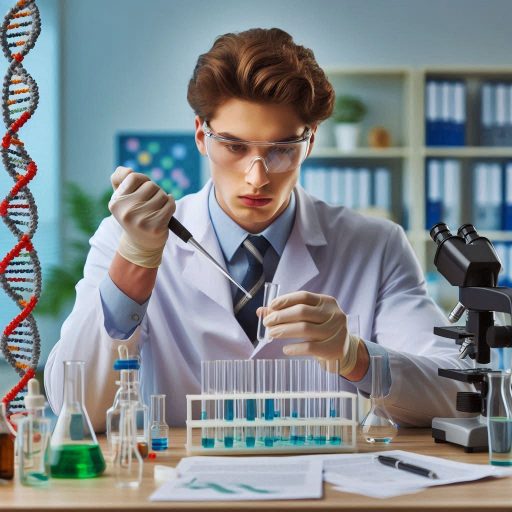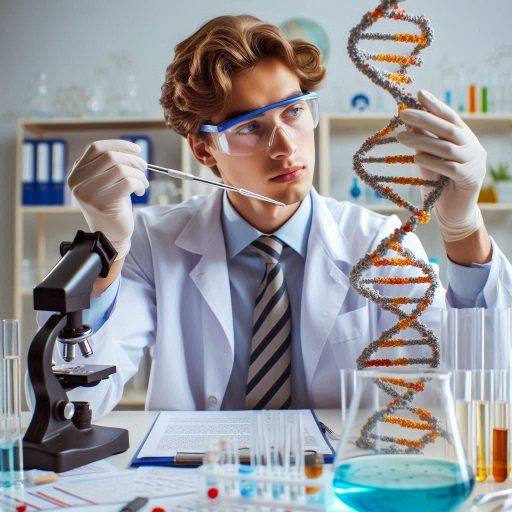Introduction
Toxicologists study the effects of chemicals and substances on living organisms and the environment.
They assess toxicity levels, evaluate risks, and ensure safety in various industries.
Their work is essential in pharmaceuticals, environmental protection, and regulatory compliance, where they guide safe practices and policies.
Having the right skills is crucial for toxicologists to succeed in their roles.
Strong analytical skills allow toxicologists to interpret complex data and make informed decisions.
They must be proficient in laboratory techniques to conduct experiments and analyze samples accurately.
Attention to detail is another vital skill for toxicologists.
Small discrepancies in data can lead to significant errors in safety assessments.
Excellent communication skills are also essential, as toxicologists often present their findings to diverse audiences, including regulatory bodies and stakeholders.
Critical thinking enables toxicologists to develop innovative solutions to emerging challenges.
They must adapt to rapidly changing technologies and regulations in the field.
Knowledge of current laws and guidelines helps toxicologists navigate compliance requirements effectively.
Employers seek toxicologists with a strong combination of technical, analytical, and interpersonal skills.
By developing these skills, aspiring toxicologists can enhance their employability and contribute effectively to public health and safety.
Educational Background
Required Degrees or Certifications
Employers seek toxicologists with the appropriate educational background and certifications.
Most positions require at least a bachelor’s degree in toxicology, biology, or chemistry.
Many employers prefer candidates with advanced degrees, such as a master’s or Ph.D. in toxicology or a related field.
A graduate degree equips toxicologists with in-depth knowledge and research skills.
Advanced training often involves extensive laboratory work and specialized coursework.
This education helps toxicologists understand complex biological systems and chemical interactions.
Certifications also enhance a toxicologist’s employability.
The American Board of Toxicology (ABT) offers a certification program that demonstrates expertise.
Becoming board-certified indicates a commitment to the field and adherence to professional standards.
Employers value candidates with relevant certifications because they signify specialized knowledge.
Certifications often require ongoing education, ensuring toxicologists remain current with industry trends.
This commitment to lifelong learning is attractive to employers seeking knowledgeable professionals.
In addition to formal education, some employers prefer candidates with experience in regulatory affairs.
Understanding regulations from agencies like the Environmental Protection Agency (EPA) or the Food and Drug Administration (FDA) is crucial.
This knowledge ensures toxicologists can navigate compliance requirements effectively.
Specialized Training in Toxicology
Specialized training in toxicology is essential for developing the skills necessary for success.
Toxicologists often undergo training in various subfields, such as environmental toxicology, forensic toxicology, or clinical toxicology.
Each specialization requires distinct knowledge and skill sets relevant to specific industries.
Environmental toxicologists focus on assessing the effects of pollutants on ecosystems.
They study chemical exposures and their impacts on wildlife and human health.
Specialized training in environmental toxicology equips professionals with skills to analyze ecological risks effectively.
Forensic toxicologists work within the criminal justice system, analyzing toxic substances in legal cases.
Specialized training in forensic techniques helps these professionals understand chain-of-custody procedures and legal documentation.
This training is crucial for presenting findings in court as expert witnesses.
Clinical toxicologists provide medical information about toxic exposures and treatments.
They must understand pharmacology and patient care to assess toxicological emergencies.
Specialized training in clinical toxicology prepares professionals to make critical decisions regarding patient treatment.
Employers also value practical laboratory experience in toxicology.
Internships or research assistant positions provide valuable hands-on training.
These experiences help candidates develop critical skills, such as analytical techniques and data interpretation.
In addition to technical skills, toxicologists must possess strong communication abilities.
They often collaborate with other scientists and communicate findings to non-experts.
Specialized training may include coursework in science communication or public health outreach.
Finally, staying current with advancements in toxicology is vital.
Ongoing education through workshops, seminars, and conferences helps toxicologists remain informed.
This commitment to professional development is crucial for adapting to new challenges and innovations in the field.
Employers look for toxicologists with required degrees and certifications.
Advanced education enhances knowledge and research skills, while certifications demonstrate expertise.
Specialized training prepares toxicologists for various subfields, such as environmental, forensic, and clinical toxicology.
Read: What Does a Geologist Do? Career Overview and Insights
Understanding of toxic substances
Knowledge of Various Toxic Substances and Their Effects on the Body
Employers seek toxicologists with a deep knowledge of various toxic substances.
This knowledge includes understanding chemical properties, biological interactions, and potential health effects.
Toxicologists must recognize how substances can cause harm to living organisms.
They should also be familiar with the mechanisms of toxicity, including dose-response relationships.
Toxicologists often work with substances such as heavy metals, pesticides, and pharmaceuticals.
Each substance has unique properties that influence its toxicity.
For example, lead exposure can cause neurological damage, while certain pesticides may disrupt endocrine function.
Understanding these effects is crucial for assessing risks and providing accurate recommendations.
Employers also value a solid grasp of toxicology principles.
Knowledge of pharmacokinetics and pharmacodynamics helps toxicologists predict how substances behave in the body.
They should know how substances are absorbed, distributed, metabolized, and excreted.
This understanding is vital for evaluating the potential for accumulation and long-term effects.
Furthermore, toxicologists must stay updated on emerging toxic substances.
New chemicals continually enter the market, requiring ongoing education and training.
Employers look for candidates who demonstrate a commitment to lifelong learning in toxicology.
Ability to Identify and Analyze Toxic Substances in Different Environments
Another essential skill for toxicologists is the ability to identify and analyze toxic substances in various environments.
Toxicologists often conduct field investigations to collect samples from different sources.
These sources may include soil, water, air, and biological tissues.
Fieldwork requires toxicologists to use various sampling techniques and equipment.
They must be proficient in collecting samples while minimizing contamination.
Employers appreciate candidates who demonstrate experience in fieldwork and laboratory analysis.
Once samples are collected, toxicologists analyze them using advanced analytical techniques.
Techniques like gas chromatography-mass spectrometry (GC-MS) and high-performance liquid chromatography (HPLC) are common in laboratories.
These methods help toxicologists detect and quantify toxic substances accurately.
Employers also value the ability to interpret analytical results.
Toxicologists must assess the significance of their findings and communicate them effectively.
Clear communication of results is vital for informing regulatory decisions and public health recommendations.
Moreover, toxicologists should understand the regulatory frameworks governing toxic substance analysis.
Familiarity with guidelines from agencies like the Environmental Protection Agency (EPA) or the Food and Drug Administration (FDA) is crucial.
This knowledge ensures compliance with legal standards and enhances credibility.
In addition to technical skills, toxicologists should possess strong problem-solving abilities.
They often encounter complex situations that require innovative thinking and adaptability.
Employers look for candidates who can develop practical solutions to toxicological challenges.
Employers seek toxicologists with specific skills and knowledge.
A deep understanding of various toxic substances and their effects on the body is essential.
Additionally, the ability to identify and analyze toxic substances in different environments is crucial.
Toxicologists who possess these skills are well-equipped to contribute effectively to public health and safety initiatives.
Read: Educational Path: Becoming a Geologist in the USA
Research skills
Proficiency in Conducting Research Studies on Toxic Substances
Employers seek toxicologists with proficiency in conducting research studies on toxic substances.
Research skills are essential for understanding the effects of chemicals on health.
Toxicologists must design experiments that accurately assess toxicological impacts.
A solid foundation in research methodology is crucial.
Toxicologists should be familiar with experimental designs, including randomized controlled trials and cohort studies.
They must also understand how to implement controls and variable factors effectively.
This proficiency ensures the reliability of research findings and conclusions.
Employers value experience in using various research techniques.
Toxicologists should be adept at in vitro (lab-based) and in vivo (animal-based) studies.
Familiarity with both types of studies enhances the versatility of toxicologists in different research environments.
Proficiency in using laboratory equipment is essential.
Toxicologists must operate instruments such as spectrophotometers, chromatographs, and mass spectrometers.
These tools are crucial for analyzing chemical samples and understanding their toxic effects.
Effective communication skills also play a vital role in conducting research.
Toxicologists must convey complex scientific concepts clearly to colleagues and stakeholders.
This skill is essential for presenting findings to regulatory agencies and the scientific community.
Experience in Data Collection and Analysis Related to Toxicology
Experience in data collection and analysis is another key skill employers seek in toxicologists.
Toxicologists must gather and interpret data accurately to draw valid conclusions.
This data can include information from clinical trials, environmental studies, and laboratory experiments.
Toxicologists should be proficient in various data collection methods.
These methods may include surveys, sampling, and observational studies.
Proper data collection ensures comprehensive analyses and reliable outcomes.
Employers also prioritize skills in statistical analysis.
Toxicologists need to analyze data sets to identify trends and relationships.
Familiarity with statistical software programs, such as R or SAS, is essential for this task.
Understanding the principles of biostatistics is crucial for toxicologists.
They must apply statistical tests to determine the significance of their findings.
This knowledge helps in evaluating risks associated with toxic exposures and informs safety regulations.
Toxicologists should be skilled in interpreting scientific literature.
They must evaluate previous studies to identify gaps in knowledge and inform future research directions.
Critical analysis of existing data ensures that toxicologists stay up-to-date with current scientific advancements.
Collaboration and Teamwork Skills
Collaboration and teamwork skills are increasingly important for toxicologists.
Many toxicology projects require interdisciplinary collaboration.
Toxicologists often work alongside chemists, biologists, and environmental scientists.
Strong interpersonal skills facilitate effective communication within research teams.
Toxicologists must share insights, discuss methodologies, and resolve challenges collectively.
This collaboration fosters innovative solutions and enhances the overall quality of research.
Employers also value adaptability and problem-solving abilities.
Toxicologists face unexpected challenges during research projects.
The ability to adjust methodologies and think critically is vital for overcoming obstacles.
Employers look for specific skills in toxicologists to ensure successful research and effective communication.
Proficiency in conducting research studies on toxic substances is essential.
Experience in data collection and analysis is equally critical for drawing valid conclusions.
Additionally, collaboration and adaptability enhance a toxicologist’s ability to thrive in diverse research environments.
By focusing on these skills, toxicologists can position themselves as valuable assets in the field.
Read: Botany Career Fairs and Networking Events
Communication Skills
Ability to Communicate Complex Scientific Information to Non-Experts
Effective communication is a top skill employers seek in toxicologists.
Toxicologists often need to explain intricate scientific concepts to non-experts.
This ability ensures that critical information is accessible to diverse audiences.
Communicating complex ideas requires clarity and simplicity.
Toxicologists must break down technical jargon into understandable language.
This skill fosters better understanding among stakeholders, including policymakers, regulatory agencies, and the public.
For instance, when discussing toxicological risks, toxicologists must present findings in relatable terms.
They should explain how certain substances can impact health without overwhelming listeners with technical details.
Engaging storytelling can help convey scientific data effectively.
Additionally, effective communication fosters collaboration among interdisciplinary teams.
Toxicologists frequently work with chemists, biologists, and regulatory professionals.
Clear communication helps align goals and facilitates smoother project progress.
Toxicologists also need to adjust their communication style based on the audience.
Understanding the background and knowledge level of listeners is essential.
Tailoring messages ensures that information resonates and is effectively understood.
Moreover, public engagement is increasingly important for toxicologists.
They must communicate findings to stakeholders and the general public.
Effective outreach builds trust and fosters informed decision-making regarding health and safety.
Strong Written and Verbal Communication Skills for Reports and Presentations
Strong written and verbal communication skills are essential for toxicologists.
They must produce clear and concise reports that convey complex data effectively.
These reports often serve as critical documents for regulatory submissions and scientific publications.
In written communication, toxicologists should emphasize accuracy and clarity.
They must present findings logically and systematically.
This approach helps ensure that readers can follow the narrative and grasp essential information.
Moreover, well-structured reports are vital for compliance with regulatory standards.
Toxicologists must adhere to specific formatting and documentation requirements.
Clarity in reporting enhances the credibility of the research and its findings.
Verbal communication skills are equally important.
Toxicologists frequently present their research to various audiences, including colleagues and industry stakeholders.
They must convey complex scientific concepts confidently and persuasively.
During presentations, toxicologists should use visuals to enhance understanding.
Graphs, charts, and images can help illustrate data effectively.
Engaging presentation styles can captivate audiences and facilitate better retention of information.
Furthermore, strong communication skills aid in addressing questions and feedback.
Toxicologists must respond thoughtfully to inquiries during discussions.
This ability demonstrates their expertise and reinforces their credibility in the field.
Effective communication promotes collaboration and teamwork.
Toxicologists often participate in multidisciplinary projects that require input from various experts.
Strong communication fosters a collaborative atmosphere, leading to innovative solutions and improved outcomes.
The ability to communicate complex scientific information is crucial for toxicologists.
They must convey intricate concepts clearly to non-experts and diverse audiences.
Strong written and verbal communication skills enhance their effectiveness in reports and presentations.
Employers value toxicologists who can bridge the gap between science and the public.
By developing these essential communication skills, toxicologists can significantly impact their field.
Effective communication not only enhances collaboration but also builds public trust in toxicological research and findings.
Ultimately, these skills contribute to safer and healthier communities.
Read: Preparing for a Botany PhD: Tips and Advice

Problem-solving skills
Critical Thinking Skills to Identify and Solve Toxicology-Related Issues
Employers seek toxicologists with strong critical thinking skills.
These skills are essential for identifying and addressing complex toxicology-related issues.
Toxicologists analyze diverse data sets to assess risks associated with various substances.
They must evaluate scientific literature, regulatory guidelines, and experimental results to draw meaningful conclusions.
Critical thinking enables toxicologists to develop hypotheses and design experiments.
They can formulate research questions that target specific toxicological concerns.
This analytical approach helps them interpret results and propose solutions effectively.
Employers value professionals who can think critically and creatively about problems.
Moreover, toxicologists must navigate uncertainties in their research.
They often encounter ambiguous data or conflicting findings.
Strong critical thinking skills help them evaluate the validity of different studies.
This evaluation allows toxicologists to provide accurate risk assessments and recommendations.
Collaboration also benefits from critical thinking.
Toxicologists often work in interdisciplinary teams, collaborating with chemists, biologists, and health professionals.
They must effectively communicate their ideas and consider diverse perspectives.
Critical thinking fosters constructive discussions that lead to comprehensive solutions.
Furthermore, critical thinking skills enhance toxicologists’ ability to stay updated with emerging research.
They need to assess new information critically and integrate it into their work.
This adaptability is vital in the ever-evolving field of toxicology, where new substances and methodologies frequently emerge.
Ability to Make Quick and Effective Decisions in Emergency Situations
In toxicology, quick and effective decision-making is crucial during emergencies.
Toxicologists often face situations that require immediate action.
For example, identifying the cause of a mass poisoning incident demands rapid analysis and response.
Employers look for toxicologists who can remain calm under pressure.
They must assess toxicological risks and recommend appropriate actions swiftly.
This ability can be life-saving in critical situations, such as chemical spills or exposure incidents.
Toxicologists also need to prioritize tasks efficiently during emergencies.
They must determine which analyses or interventions are most urgent.
This skill ensures that resources are allocated effectively to mitigate harm.
Moreover, the ability to make informed decisions quickly can influence the outcome of an investigation.
In cases of poisoning or exposure, timely interventions can save lives and minimize health impacts.
Employers value toxicologists who can act decisively while considering potential risks and benefits.
Effective communication plays a role in emergency decision-making.
Toxicologists must convey their findings to emergency responders, healthcare providers, and law enforcement.
Clear communication ensures that all parties understand the situation and can act accordingly.
Training and experience in emergency response further enhance decision-making abilities.
Toxicologists who have participated in crisis simulations or emergency drills are better prepared for real-world scenarios.
These experiences build confidence and improve their ability to make sound decisions under pressure.
Employers prioritize critical thinking and quick decision-making skills in toxicologists.
Critical thinking enables toxicologists to analyze data, develop hypotheses, and collaborate effectively.
The ability to make rapid decisions is essential during emergencies, ensuring timely interventions and risk mitigation.
Together, these skills contribute to successful toxicology practices.
By honing these abilities, aspiring toxicologists can enhance their employability and make meaningful contributions to public health and safety.
Attention to Detail
Keen Eye for Detail in Analyzing Toxicology Data
Employers seek toxicologists with a keen eye for detail.
This skill is vital for accurately analyzing and interpreting toxicology data.
Toxicologists must scrutinize data sets for anomalies or trends.
Small errors in data interpretation can lead to significant consequences.
Attention to detail also enhances the quality of research.
Toxicologists must ensure their findings are reliable and reproducible.
This reliability builds credibility within the scientific community and among regulatory bodies.
Employers appreciate toxicologists who can identify critical data points that influence safety assessments.
In toxicology, data comes from various sources, including laboratory experiments and clinical studies.
A detail-oriented approach enables toxicologists to synthesize information effectively.
By recognizing patterns and relationships within the data, they can make informed conclusions.
Moreover, thorough documentation is crucial in toxicology research.
Employers value toxicologists who maintain accurate records of their analyses.
This documentation provides transparency and supports future research efforts.
It also ensures compliance with regulatory requirements, which is essential in the field.
Thoroughness in Carrying Out Experiments
Thoroughness is another key skill employers seek in toxicologists.
This skill involves meticulously planning and executing experiments.
Toxicologists must follow protocols rigorously to ensure valid results.
Any deviation from established methods can compromise the integrity of the research.
Employers look for toxicologists who approach experiments systematically.
They should be able to design experiments that effectively address specific research questions.
This requires a deep understanding of toxicological principles and methodologies.
In addition, thoroughness extends to the analysis of experimental results.
Toxicologists must analyze data comprehensively to draw accurate conclusions.
They should also be able to replicate experiments to confirm findings.
Replication strengthens the validity of results and fosters trust in their work.
Employers appreciate toxicologists who demonstrate a commitment to quality.
This commitment manifests in the careful execution of experiments and attention to detail in data analysis.
A thorough approach enhances the overall reliability of research outcomes.
Importance of Documentation and Reporting
Proper documentation is a crucial aspect of thoroughness in toxicology.
Toxicologists must record every step of their experiments, including methodologies, observations, and results.
This documentation allows for reproducibility and peer review, which are essential in scientific research.
Moreover, clear reporting of findings is vital for effective communication.
Toxicologists should be able to present their results in an understandable manner.
This ability is especially important when conveying complex concepts to non-specialist audiences, including regulatory officials and the public.
Effective communication of findings fosters collaboration within multidisciplinary teams.
Toxicologists often work with chemists, biologists, and environmental scientists.
Clear documentation and reporting facilitate seamless collaboration and enhance research outcomes.
In essence, employers value several key skills in toxicologists.
A keen eye for detail is essential for accurately analyzing and interpreting toxicology data.
Thoroughness in carrying out experiments and documenting findings is equally critical.
Together, these skills ensure high-quality research and foster trust within the scientific community.
Toxicologists who excel in these areas are well-equipped to make significant contributions to public health and safety.
By honing these skills, aspiring toxicologists can enhance their employability and impact in the field.
Teamwork and Collaboration
Experience Working Collaboratively with Other Professionals
Employers highly value toxicologists with collaborative experience.
Toxicology research often involves interdisciplinary teams.
These teams may include chemists, biologists, and environmental scientists.
Working collaboratively enhances the depth of research and improves project outcomes.
Successful collaboration requires effective communication skills.
Toxicologists must convey complex information clearly to colleagues.
They should be able to explain their findings in a way that everyone understands.
This is crucial for making informed decisions during projects.
Additionally, teamwork fosters a supportive research environment.
Toxicologists can learn from each other’s expertise and perspectives.
This collective knowledge can lead to innovative solutions for challenging problems.
Collaboration also promotes the sharing of resources and equipment.
This can result in more efficient project completion.
Employers seek candidates who can build strong professional relationships.
Networking within the field can lead to future collaborations.
Toxicologists should be proactive in establishing connections with their peers.
This network can provide valuable insights and open doors for new opportunities.
Transform Your Career Today
Unlock a personalized career strategy that drives real results. Get tailored advice and a roadmap designed just for you.
Start NowAbility to Work Effectively as Part of a Team
Toxicologists must work effectively as part of a team.
Teamwork is essential in managing complex toxicology projects.
Different team members bring unique skills and experiences to the table.
This diversity strengthens the research process and enriches findings.
In team settings, toxicologists often assume specific roles.
They may lead experiments, analyze data, or coordinate project timelines.
Each role is critical for ensuring that projects run smoothly.
Team members must be adaptable and willing to take on various tasks as needed.
Effective teamwork requires trust and respect among members.
Toxicologists must demonstrate reliability and accountability in their work.
Meeting deadlines and fulfilling responsibilities builds trust within the team.
This mutual respect fosters a positive working atmosphere, enhancing overall productivity.
Conflict resolution skills are also important in team settings.
Disagreements may arise during project discussions.
Toxicologists should approach conflicts with an open mind and willingness to listen.
Finding common ground is essential for maintaining team cohesion.
Toxicologists should embrace feedback from their colleagues.
Constructive criticism helps improve individual performance and project outcomes.
Being open to suggestions can lead to innovative approaches and solutions.
Employers look for toxicologists who can inspire and motivate their teammates.
A positive attitude and strong work ethic can boost team morale.
Toxicologists who lead by example create a supportive and productive environment.
In summary, experience working collaboratively with other professionals is crucial for toxicologists.
The ability to work effectively as part of a team significantly impacts project success.
Toxicologists should demonstrate adaptability, trustworthiness, and conflict resolution skills.
Embracing feedback and motivating team members contributes to a positive working environment.
Developing these skills prepares toxicologists for successful careers in research and industry.
By focusing on collaboration and teamwork, toxicologists can enhance their contributions to the field and drive impactful results.
Adaptability and Flexibility
Ability to Adapt to Changing Work Environments and New Technologies
Employers seek toxicologists who can adapt to changing work environments.
The field of toxicology constantly evolves, presenting new challenges and opportunities.
Toxicologists must be flexible and open-minded to thrive in this dynamic landscape.
They often work in various settings, including laboratories, field sites, and regulatory agencies.
Rapid advancements in technology also influence toxicology practices.
New tools and techniques emerge frequently, requiring toxicologists to learn and adapt.
Employers value professionals who embrace these changes rather than resist them.
Those who can quickly master new technologies enhance their effectiveness in the lab.
Adaptability extends beyond technology.
Toxicologists may face unexpected challenges, such as changes in regulations or project scope.
Employers appreciate candidates who remain calm and resourceful during these situations.
A flexible mindset allows toxicologists to pivot strategies and maintain productivity.
Furthermore, teamwork plays a crucial role in adapting to new environments.
Toxicologists often collaborate with experts from various disciplines.
Strong communication and interpersonal skills facilitate effective teamwork, helping professionals adjust to group dynamics.
Employers look for individuals who can work harmoniously in diverse teams.
In addition, adaptability includes a commitment to continuous improvement.
Toxicologists should regularly assess their skills and identify areas for growth.
Employers favor candidates who actively seek feedback and pursue professional development.
This mindset fosters resilience and enhances career advancement opportunities.
Willingness to Keep Up with Advancements in the Field of Toxicology
A willingness to keep up with advancements in the field is essential for toxicologists.
The scientific landscape is continually changing, driven by research and technological progress.
Employers value professionals who remain current on trends, regulations, and methodologies.
Staying informed about the latest research helps toxicologists make informed decisions.
It enables them to apply cutting-edge techniques in their work.
Employers appreciate candidates who read scientific literature and attend relevant conferences.
These activities demonstrate a commitment to staying knowledgeable in the field.
Moreover, advancements in toxicology often lead to new regulatory requirements.
Toxicologists must be aware of these changes to ensure compliance.
Employers look for professionals who actively monitor regulatory updates and adapt their practices accordingly.
This proactive approach helps organizations maintain high safety standards.
In addition, technological advancements introduce innovative research methodologies.
Toxicologists should be willing to explore new tools and techniques.
Familiarity with emerging technologies, such as bioinformatics and high-throughput screening, enhances their research capabilities.
Employers prefer candidates who can leverage these advancements to improve efficiency and accuracy.
Furthermore, ongoing education is vital for career growth in toxicology.
Employers value toxicologists who pursue additional training and certifications.
Engaging in lifelong learning not only enhances skills but also demonstrates dedication to the profession.
This willingness to learn sets candidates apart in a competitive job market.
Employers seek toxicologists who can adapt to changing work environments and new technologies.
The ability to remain flexible and resourceful is crucial in this evolving field.
Additionally, a commitment to staying informed about advancements in toxicology is essential.
Toxicologists who actively pursue knowledge and professional growth position themselves as valuable assets to their organizations.
In closing, these skills enhance their effectiveness and contribute to the advancement of the toxicology field.
Conclusion
Employers seek specific skills when hiring toxicologists to ensure they can perform effectively in their roles.
First, a strong foundation in chemistry and biology is essential.
Toxicologists must understand complex chemical interactions and biological responses to substances.
Analytical skills also rank high, as toxicologists need to interpret data accurately and assess risks associated with various compounds.
Attention to detail is crucial in toxicology, as small errors can lead to significant consequences.
Employers value professionals who can maintain high standards of accuracy in their research and testing.
Communication skills are equally important, as toxicologists must convey complex findings clearly to diverse audiences, including regulatory bodies and the public.
Problem-solving skills enable toxicologists to address challenges and develop innovative solutions in their work.
Adaptability is vital in this evolving field, as new technologies and regulations continually emerge.
To succeed in toxicology, professionals must continually develop and hone these skills.
Engaging in ongoing education, attending workshops, and seeking mentorship can enhance expertise.
By staying updated on advancements in toxicology, professionals can maintain their competitive edge.
Employers look for strong technical skills, attention to detail, and effective communication in toxicologists.
[E-Books for Sale]
The Big Book of 500 High-Paying Jobs in America: Unlock Your Earning Potential
$19.99 • 500 High-Paying Jobs • 330 pages
Explore 500 high-paying jobs in America and learn how to boost your career, earn more, and achieve success!
See All 500 High-Paying Jobs of this E-Book
1001 Professions Without a Degree: High-Paying American Jobs You Can Start Now
$19.99 • 1001 Professions Without a Degree • 174 pages
Discover 1001 high-paying jobs without a degree! Unlock career tips, skills, and success strategies for just $19.99!




